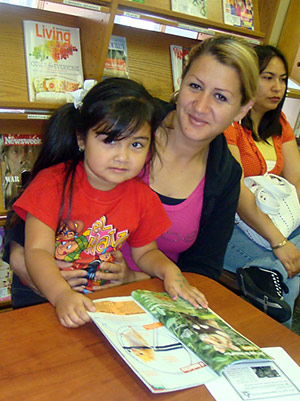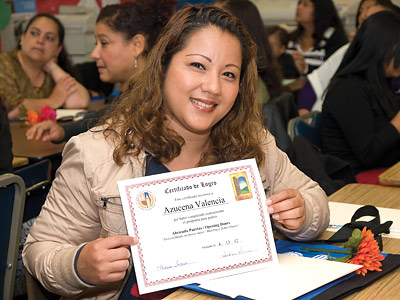Survey shows program boosts Latino parents’ child knowledge, confidence
While many Latino children enter school hampered by weak preliteracy skills, a new program tied to Head Start successfully equips parents to close these gaps, according to findings out today from the University of California, Berkeley.

The program’s effects, Bridges said, “were impressive and important, since it’s the daily interactions with parents, starting at birth, that make such a difference in how ready young children are to start school.”
The team’s study also indicates that parents who took the training,taught in Spanish or English, reported substantial gains in knowledge about their rights as parents and their children’s rights, as well as self-confidence in their parenting and teaching skills. Researchers said the impact of these improvements can be critically important, especially because parents are their children’s very first and frontline teachers.
“It makes perfect sense that the National Head Start Association has adopted the Abriendo Puertas/Opening Doors program, which empowers Latino parents to become better teachers and advocates for their children,” said Yasmina Vinci, executive director of the National Head Start Association. “Parental involvement and community engagement are core elements of how Head Start has provided more than 27 million children a window of opportunity for success in life. Abriendo Puertas/Opening Doors counteracts the damaging effects of inequity and is a positive catalyst toward positive generational change.”
In 10 sessions, the Abriendo Puertas/Opening Doors parenting program uses local data to teach parents best practices and prepare them to take positive action in the following areas:
- Early learning and development, such as the importance of preschool and how children’s brains develop
- Communication and family goal-setting
- Nutrition and exercise
- Understanding parent responsibilities and advocating for their children’s right to a quality education
- Library visits
Research shows that before the training, only 43 percent of the surveyed parents knew all the answers to questions about early learning, the most important time period for children’s brain development, and the most important areas of child development. Afterward, the percentage increased to 89.

As for parents’ knowledge about what it takes to help their children be successful in school, just 12 percent answered five or more of the seven questions right before the training, but the percentage jumped to 77 after Abriendo Puertas.
When asked about how best to facilitate language learning and literacy, only 34 percent of parents answered all six questions correctly before the training, but 65 percent got them all right after the classes.
“The question is no longer whether or not family engagement in our schools is important, but rather whether this engagement is meaningful to their children’s growth and development. Abriendo Puertas brings this meaning to families—helping them to see the importance of their roles in the home, schools and community at-large,” said Pedroza.
The UC Berkeley study findings reflect the results of second-generation Abriendo Puertas/Opening Doors programs. The evaluation was based on pre- and post-program survey questionnaires completed by 623 parents in 35 programs in six states. Some 85 percent of the parents were immigrants and most were from Mexico. A little over a quarter reported finishing elementary school, and 27 percent said they had a high school diploma or attended some college. Most said they had two children.
Abriendo Puertas/Opening Doors launched in 2007 as a parenting program dedicated to getting young children ready for school. Today, it reaches 22,000 families in 31 states and Puerto Rico. Abriendo Puertas/Opening Doors also conducts three-day institutes to teach local educators, community leaders and facilitators the Abriendo Puertas model, and how to take the program into their local communities.